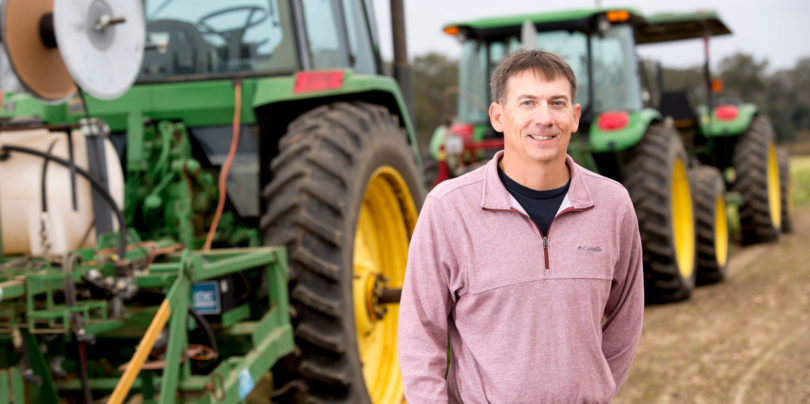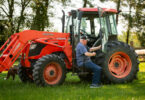Stanley Culpepper, a professor in the College of Agricultural and Environmental Sciences and an extension weed scientist, travels the state and the world sharing research results that promote agricultural productivity and sustainability.
Where did you earn degrees and what are your current responsibilities at UGA?
I grew up on a bicentennial family farm in northeastern North Carolina, so N.C. State University was the only place for me. Being close to home, I was able to get a great education while still helping out on the family farm. In 1993, I obtained my B.S. in agronomy and followed with M.S. and Ph.D. degrees in weed science in 1996 and 1999, respectively, under the direction of Dr. Alan York.
As a professor in the College of Agricultural and Environmental Sciences and an extension weed scientist, I not only get to conduct research that will help growers control weeds but I also get to work directly with them as they adopt procedures or technologies that improve productivity and sustainability. Weed management has traditionally been one of the most challenging tasks in producing vegetables and, with the development of herbicide resistant weeds, has become a threat to the production of all agronomic crops, including cotton and wheat.
When did you come to UGA and what brought you here?
A few weeks before graduating in 1999, I began my career at the University of Georgia at the Tifton campus. My attraction to UGA was really in response to three factors. First, Georgia’s agriculture is intense, dynamic and continues to be the No. 1 enterprise for the state; of course, this is appealing to anyone who loves agriculture. Second, the Cooperative Extension Service at UGA is without a doubt the most effective extension system in the world. Having an opportunity to work with an organization that has the ability to disseminate information effectively and rapidly with top-down support and leadership is an honor. Third, the commitment of the university’s administration to not only support research and teaching but to also support extension was critical. There is no question, at least in my mind, that applied agriculturalists are the key for long-term agricultural sustainability.
What are your favorite courses and why?
My classroom is a little different than most professors. Although I guest lecture at times, I don’t teach students in a classroom. Rather, I travel the state and the world sharing research results through Extension. My favorite “course” is the presentation that I give that helps someone be more productive, more economical, more efficient, more environmentally friendly, and/or more sustainable. Over my career, I have been blessed to give over 900 educational-based presentations across 24 U.S. states and multiple countries … that’s a pretty cool classroom.
What interests you about your field?
Agriculture is the oldest and most important profession in the world; not to mention one of the most challenging. As the human population grows rapidly, a farmer’s ability to feed the rising population will be directly related to innovative research and the ability of individuals to disseminate research results in formats that are easily adoptable. Having the opportunity to not only conduct research but to share the results of that research with growers in ways that help them feed the world is pretty cool. My job is fascinating, challenging and occasionally stressful, but being just a small part of the information development and delivery system for agriculture is an honor.
What are some highlights of your career at UGA?
If I had to choose, I would probably point to two highlights. First, the removal of methyl bromide (deemed an ozone depleting gas) from vegetable growers posed a serious risk to fresh market vegetable production in Georgia. The crops relying on methyl bromide, at the time, had an annual farm gate value exceeding $250 million. As a UGA team, we not only developed effective alternatives to methyl bromide but also helped our growers implement them rapidly. As a result of this work, the Environmental Protection Agency awarded us with the Montreal Protocol Award for assisting in the preservation of the ozone layer and thereby saving many lives. Georgia Sens. Chambliss and Isakson made the nomination to the EPA.
Second, working with the Georgia Fruit and Vegetable Growers Association, we developed third-party labeling for Georgia growers. This process allows a pathway for industry, UGA and the Georgia Department of Agriculture to work together to bring Georgia vegetable growers weed management tools that would not otherwise be possible. Although the process continuously evolves, ultimately this effort has resulted in over 30 new herbicide labels available for Georgia growers to help manage weeds more effectively and efficiently.
How does your research or scholarship inspire your teaching, and vice versa?
My research goal is to develop information that keeps our growers on the cutting edge of production, efficiency and sustainability. The best way to develop this type of research is to have input from those that you are “teaching.” Thus, my greatest success comes when growers or Extension agents share the challenges that are limiting their success. After understanding these challenges, research can then be developed to address the issues. However, we must not forget, the best research in the world is of no value if it is not shared with the end user in a format that is understandable and adoptable.
Describe your ideal student.
For me, dedication and respect are the two key characteristics of any student. If you are a student (or not) and you are truly dedicated to your mission while treating others with respect, then most often success is imminent. For those who are truly dedicated, the energy level and desire they exhibit to succeed and overcome failure is amazing. And when you are dedicated and respectful, that is when you begin to form special bonds and relationships with others who often have the same desires. It is these relationships that most often lead to impact, teamwork, success and family.
Favorite place to be/thing to do on campus is…
On campus, my most enjoyable times occur on the university’s research farms conducting applied research. Being in the field is amazing, as I learn new information most every day; plus, it is easier to hide and take a break from the daily stresses. Of course, the best place to be professionally is to actually be on a grower’s farm helping them address their weed management challenges.
Beyond the UGA campus, I like to…
Well, being from a family farm and having best friends who are either farmers or are involved with agriculture in some fashion leads to the fact that I never really get away from agriculture. However, the time I cherish the most is that which I spend with my family. Having a 6-year-old, full of energy, is always entertaining, exciting and unpredictable. Our most fun times often come when we are out catching butterflies or other critters, watching movies, visiting amusement parks and playing games that I never get to win.
Favorite book/movie (and why)?
Having a 6-year-old eliminates my ability to select books or movies. Although, I am amazed how entertaining kid movies/books have become. “Wreck it Ralph” and “The Croods” are movies that are amazingly entertaining for the entire family. Although these movies are probably not on the lists of favorites for most adults, they do help children and adults realize the value of family and friends.
Proudest moment at UGA?
Professionally, there is nothing that I am more proud of than having the opportunity to work with such a great group of people at the University of Georgia’s Tifton campus. The overall commitment to agriculture from the collective group is mind boggling and humbling. Additionally, my team of technicians and students who actually run my program while I am usually off attending various functions amaze me with their commitment, respect, and productivity … these guys allow me to have my proudest moment at UGA every day.
(Originally published on Feb. 28, 2016)






